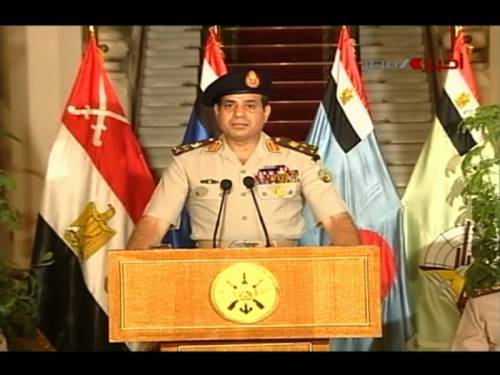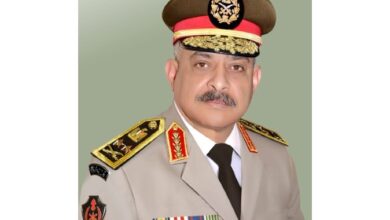
In Egypt, it no longer appears to be a question of if, but when, army chief Abdel Fattah al-Sisi will declare his candidacy for president. For the second time in three days, local media reported on Monday that Sisi had finally made up his mind.
With no other obvious candidates for the post, the general who deposed Islamist President Mohamed Mursi in July has kept Egyptians guessing about his intentions as the clock ticks down to the presidential vote that could happen as soon as April.
Sisi's candidacy would further deepen divisions between the many Egyptians who believe a firm hand is needed to steer the country through crisis and Islamists bearing the brunt of a state crackdown on dissent.
Speaking to Reuters on condition of anonymity, an official in the security services said Sisi was "most likely going to announce that he will run for the presidency", adding: "The army in a recent meeting expressed its support for him to run."
The question of Sisi's intentions has become more pressing since the army-backed authorities signaled that the presidential election will come ahead of parliamentary polls – reversing the original timetable.
In public statements, the army has said nothing on Sisi's intentions – the major outstanding question of the political transition set in train after the military deposed Mursi following mass protests against his rule on June 30.
Responding to a local TV report saying Sisi would run, the army issued a statement on Saturday saying the military did not make declarations via anonymous sources and urging the media to show professionalism in its reporting.
But it did not clearly deny the main elements of the report read out during an evening talk show on MBC Egypt: that Sisi will now run and Sedki Sobhi, currently chief of staff, will take his place as defense minister and army chief.
There is little doubt Sisi would win the election, turning the clock back to the days when the presidency was controlled by men from the military – a pattern interrupted by Mursi's 2012 win and one year in office.
Though Sisi enjoys broad support among those Egyptians happy to see the end of Mursi's rule, he is reviled by his Islamist opponents, who view him as the mastermind of a bloody military coup against the country's first freely elected head of state.
The army-backed government has mounted a crackdown on Mursi's Muslim Brotherhood, driving it underground and prompting fears of longer term instability. Prominent secular dissidents have also been arrested in a blow to political freedoms.
But Sisi's supporters see him as the kind of strong man needed to bring stability after three years of turmoil. His face has appeared on posters and chocolates, he has been lionised by the media and songs have been dedicated to him and the army.
Decision seen after referendum
In his last public remarks on whether he would run, Sisi, 59, held open the possibility. "Let's see what the days bring" he told a Kuwaiti newspaper in a November 21 interview.
People familiar with Sisi's thinking have said he was by no means set on the idea of running for the presidency of a country facing economic and political crises.
But with little time left for another candidate to be introduced to the public, analysts say he now has no choice.
It seems unlikely that Sisi, who received military training in the United States, will make an announcement before a January 14-15 referendum on a new constitution drawn up as part of the transition plan, analysts and politicians say.
The referendum marks the first time Egyptians have voted since Mursi's removal, and is seen as much as a public vote of confidence on the roadmap and Sisi as the constitution itself.
Mohamed Abolghar, head of the Egyptian Social Democratic Party, forecast that Sisi would announce his candidacy and step down from his official positions after the referendum.
"Then he will prepare for elections. That's what seems likely to happen," added Abolghar, whose party counts the interim prime minister among its members.
Abolghar also forecast that no prominent liberal or leftist politicians would run against Sisi.
None of the candidates defeated by Mursi in the 2012 election have declared their candidacy this time around.
And the Nour Party, an ultra-orthodox Islamist group that came second to the Brotherhood in 2011 parliamentary elections, has said it will not run a candidate for the presidency.
The dearth of campaigning is a stark contrast to the frenetic period leading up to the 2012 vote, when the field included former air force commander Ahmed Shafik, leftist Hamdeen Sabahi, ex-Arab League chief Amr Moussa and Abdel Moneim Abol Fotouh, a moderate Islamist.
Mustapha Kamel Al-Sayid, a political science professor at Cairo University, said the election may shape up to be more of a "presidential plebiscite" on Sisi than a hotly contested vote.
"I am sure there will be other candidates but I don't think there will be any serious candidates that will have the courage or audacity to run against Sisi," he said.




